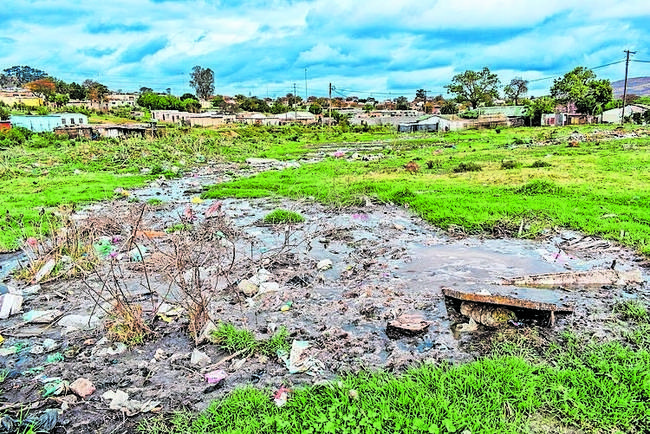

NEWS ANALYSISFlooded with filth: Rivers of sewage flow from a marsh in Scotts Farm, Makhanda. The marsh itself (above) has been created by overflowing drains. (Lucas Nowicki)
How bad is it?
One measure of sewerage plant failure is downstream microbiological contamination. In the government’s 2022 National State of Water Report, only 14% of water services authorities achieved 89% compliance, the threshold for being considered excellent. Some 20% of these authorities around the country had no data, not a recipe for confidence.
Microbiological compliance is based on measuring E. coli or faecal coliforms (a broad group of bacteria that includes E. coli), bacteria that should be eliminated from the waste stream. Healthy animals (and people) have coliforms in their gut but some can be harmful. Sewerage plants should eliminate all harmful bacteria before they release water. If they fail this test, it could indicate that the plant is running over capacity, leading to leaks upstream.
All of this is the routine that many of our people live through day in and day out. Every now and then a real disaster such as a cholera outbreak hits the news. But that is the exception (though it could become scarily widespread, the way things are).
Why is it acceptable for people to live under such conditions? It is as if our people do not have constitutional protections of the right “to an environment that is not harmful to their health or wellbeing” (S24(a)).
Corruption Watch’s 2020 Money Down the Drain report provides a sobering survey of the scale of the problem in both the water and sanitation areas.
Because water and sanitation are such essential services, they attract massive funding and massive funding attracts massive fraud.
Corruption Watch recommends a range of measures to reverse corruption in this sector, including designating the area as an “island of integrity”, with an anti-corruption forum that would direct reports of corruption to the agency best able to deal with them. Another proposal is to end impunity — which in effect means that adverse findings of the auditor general should actually have an effect.
They propose further measures. But none of this matters if we have a government that does not care —unless people stand up for their rights.
Let us take just one example: making audits stick. The key legislation — the Public Finance Management Act (PFMA), Municipal Finance Management Act (MFMA) and Public Audit Act (PAA) — have provisions for recovering fruitless, wasteful or irregular expenditure from those responsible.
The auditor general’s office has powers under the latest PAA that took effect in 2019 to issue Certificates of Debt if such expenditure is discovered, consistent with the requirements of PFMA or MFMA. How many such certificates of debt have been issued? I am not aware of one. Yet my own Makana municipality has had years when there have been more than 90 items in the audit disclaimer.
Taking a cue from the Corruption Watch report, what we need is tight monitoring of a few critical sectors such as water and sanitation, and ensuring that those responsible for corruption or wasteful expenditure (often the same thing) are held to account. They should be forced to pay the money back and face criminal prosecution if there is outright theft or fraud.
The problem is: how to get all this enforced? Again, the Corruption Watch report provides a pointer: anti-corruption forums. If the government does not form them, there is nothing to stop civil society from doing so. Such a forum may not have the weight of state power, but it can put pressure on state institutions. It can feed evidence to the Special Investigating Unit, it can launch legal actions against state entities that manifestly fail in their duties and it can create political pressure to force the government to act in the best interests of the residents (sometimes called “doing their job”).
Why does all this matter?
Because it is the poor and the vulnerable who are harmed the most. Those with more money can buy their way out of the problem, or have more political power to force problems to be fixed in their home patch.
If we feel for the granny whose home was flooded with sewage, the child who dreamed of a park or the shack dwellers whose bucket toilets feed a leaking sewer, we can and should demand better of the government. And if it does not perform we need to form civic movements that will force it to deliver.